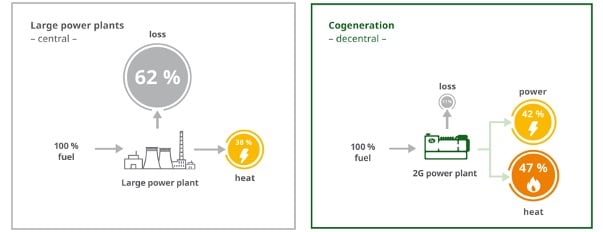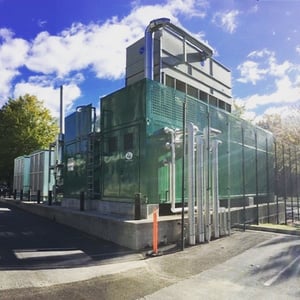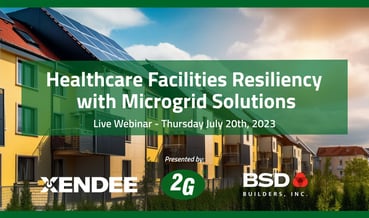Microgrids and CHP Systems: Enhancing Energy Resilience
Combined Heat and Power (CHP) systems are transforming communities and bolstering their energy resilience. In this blog post, we will dive into microgrids, explore their benefits, and uncover how an impressive project plays a vital role in enhancing energy resilience and safeguarding critical public services during electric distribution system outages.
This case study showcases the successful integration of clean energy technologies, including CHP systems, solar photovoltaic canopies, electric vehicle charging stations, and a robust cyber security system. Let's delve into the fascinating details of this project and discover the transformative power of Microgrids in bolstering community resilience.
![]()
Understanding Microgrids: Energizing Local Communities:
Microgrids, the energy industry buzzword, are revolutionizing how communities generate and consume power. Picture this: a self-contained energy ecosystem that seamlessly integrates various energy sources, including solar, wind, battery, CHP, Grid, MG controller, and even traditional fossil fuels, to power a localized area. These localized power grids are designed to operate both connected to and independent of the main power grid. The result? Enhanced reliability, reduced transmission losses, and increased resilience in the face of unexpected outages or natural disasters.
The Power Duo: Microgrids and CHP Systems:
Now, let's focus our attention on the dynamic duo that propels the success of microgrids—Combined Heat and Power (CHP) systems. Also known as cogeneration, CHP systems are ingenious energy solutions that maximize power generation efficiency by simultaneously producing electricity and useful thermal energy. By harnessing the heat generated during electricity generation, CHP systems create a win-win situation for communities, enabling them to meet their electricity needs while utilizing the waste heat for heating or cooling purposes.

Empowering Local Energy Resilience with CHP Systems:
CHP systems are integral to enhancing local energy resilience within microgrids. These systems offer efficient fuel utilization, providing electricity and heat simultaneously with up to 80% efficiency. By integrating CHP systems into microgrids, communities gain control over energy consumption, reduce reliance on centralized power, and ensure uninterrupted power supply during grid outages. This promotes environmental stewardship, lowers energy costs, and fosters a resilient and sustainable future for local energy systems.
Case Study: Microgrid Project at PSHQ
The Microgrid Project at PSHQ (Public Services Headquarters) in Gaithersburg, MD, is a comprehensive initiative designed to ensure the resiliency of critical public services, even during major electric distribution system outages. PSHQ serves as the primary administrative hub for vital services such as transportation management, the County's Office of Emergency Management and Homeland Security components, and the central police station for a significant portion of the County.
This remarkable project brings together various clean energy technologies, resulting in an annual reduction of 5,900 metric tons of greenhouse gas emissions—the equivalent of removing over 1,200 cars from the road. Let's explore the key components of this project:
Combined Heat and Power (CHP) System:At the core of the Microgrid Project is an 800 kW Combined Heat and Power (CHP) system developed by 2G Energy Inc. This innovative technology enables simultaneous electricity and thermal energy generation, maximizing energy efficiency and minimizing waste. The CHP system ensures a reliable power supply, even during grid outages, keeping critical public services operational.
Solar Photovoltaic Canopies:The Microgrid Project incorporates 2 megawatts (MW) of solar photovoltaic canopies strategically mounted over the existing parking lot. These solar panels harness the power of the sun, generating clean electricity and providing an environmentally friendly energy source for the facility.
Electric Vehicle Charging Stations:Recognizing the importance of sustainable transportation, the Microgrid Project includes electric vehicle charging stations. These stations offer convenient access to clean energy charging infrastructure, promoting the adoption of electric vehicles and reducing transportation-related greenhouse gas emissions.
Cyber Security System:Protecting critical infrastructure from cyber threats is crucial in today's interconnected world. The Microgrid Project at PSHQ incorporates a robust cyber security system, ensuring the integrity and reliability of the microgrid infrastructure and safeguarding against potential cyber risks.
Conclusion:
The Microgrid Project at PSHQ exemplifies the transformative potential of Microgrid technology in enhancing community resilience and ensuring the uninterrupted operation of critical public services during electric distribution system outages. By integrating clean energy technologies such as solar photovoltaic canopies, Combined Heat and Power (CHP) systems, electric vehicle charging stations, and robust cyber security measures, this project sets a remarkable example for other communities to follow. This case study shows how Microgrids offer practical solutions to enhance energy resilience, reduce greenhouse gas emissions, and promote sustainability. The Microgrid Project at PSHQ stands as a beacon of innovation, empowering communities to overcome challenges and thrive in a world of evolving energy landscapes.
If you are interested in learning more about microgrids and their potential benefits, we encourage you to attend our upcoming webinar Healthcare Facilities Resiliency with Microgrid Solutions. To register for the webinar, click here.
When: July 20th, 2023, at
Time: 10:00 AM EST
Topics:
- The benefits of microgrids for healthcare facilities
- The different types of microgrids that can be used in healthcare settings
- The challenges of implementing microgrids in healthcare facilities
- The latest trends in microgrid technology
The webinar will be hosted by 2G Energy. 2G will be joined by a panel of industry experts who will discuss their experiences with microgrids in healthcare settings.
To register for the webinar, please click here.
Author: Affan Ghori


